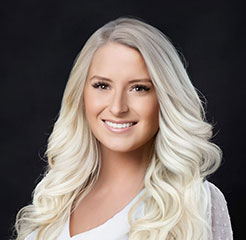Kate Dorrlacombe Profiled in the April Issue of The Secured Lender

Kate Dorrlacombe is a senior vice president in SLR Business Credit’s Fast Pay division. She oversees underwriting for the digital finance group. Kate graduated from the University of Iowa with Bachelor’s degree in finance and entrepreneurial management and a minor in Spanish. She worked as a financial analyst at IBM, and then moved to California where she worked as a financial analyst at Disney and Wells Fargo. Kate gained a lot of her credit foundation through Wells Fargo’s commercial banking credit training program. She joined Fast Pay as an underwriter in 2015 and quickly rose in the ranks to become the manager and lead a team of underwriters. At SLR Business Credit, Kate works closely with the business development and portfolio management teams to structure and onboard new invoice finance and asset-based lending facilities and is also involved in relationship management. Aside from her job, Kate is a member of the Association of Junior Leagues International and a strong supporter of the Special Olympics. Kate lives in Santa Monica, CA with her dog, Lennon, and visits her family in Iowa whenever she has the opportunity.
Studies have shown women are more reluctant to tout their accomplishments in the workplace. What advice would you give to help women be more comfortable with speaking up?
Treat yourself like a business. Market and promote yourself and your successes. Sell your accomplishments and strengths. We would not expect potential customers to know about our businesses without the help of talented marketing and business development teams, just as we would not expect customers to choose our solutions without skilled salespeople selling their advantages. Know that it’s often unintentional when a manager doesn’t recognize your accomplishments and makes your accomplishments visible!
If touting your accomplishments makes you feel uncomfortable, acknowledge the feeling but know that it will pass. Think about all the hard work you’ve contributed! A few minutes of sitting with the discomfort is worth the recognition of the time and energy you’ve put into your achievements. If you feel like you’re giving off the wrong impression when you speak up, focus more on the impact your accomplishments have made on others, and elevate other women often so you don’t feel so out of place doing it for yourself.
What do you enjoy most about your role?
The two things I enjoy most about my role are relationships and autonomy. I consider myself a people person, but also love growing my credit and analytical skill set. While my job is a credit function, I’m heavily involved with the sales team helping to negotiate and get deals over the finish line. Further, meeting with and interviewing the decision-makers of prospective clients allows me to work with some amazing entrepreneurs and executives. It’s also very motivating to have the autonomy to form my own recommendations and have a real influence on whether each deal is approved and how it’s structured. I’ve held different roles in my past where there was always a black or white, right or wrong answer, and that felt very limiting to me. As the head of underwriting, the broader team relies on my recommendations and creativity to structure complex deals in a way that provides the maximum impact for the customer while preserving the credit quality of our portfolio.
How can commercial finance organizations attract and retain more women?
First and foremost, representation in leadership is imperative. Having diverse leaders – external hires, internally promoted leaders, women with children, women with tenure, young women, etc. in leadership positions will resonate with others. For example, it will always stick with me that a former employer promoted a woman to a senior executive position when she was just a few weeks from commencing maternity leave. It said volumes about how the company stood against discrimination that women commonly face.
Secondly, providing equitable access to senior executives for both men and women should be a standard. The reality is there are more senior executives that are male than female in the commercial finance industry and getting ahead often includes accessing the valuable insight and knowledge from male executives and finding sponsors and advocates to help advance your career. Organizations should work to avoid situations where men and women have different access to leaders, and proactively work toward creating equitable opportunities for underrepresented groups. A few examples of disparities in access might include executives traveling or grabbing meals with primarily their same gender, including one gender in certain conversation topics, having a go-to group for sports networking events, or having different levels and methods of communication for different genders. While each executive’s boundaries are their own, being cognizant of whether the boundaries are comparable for both men and women will result in a more inclusive environment.
To view all of the Women in Secured Finance Profiles, visit
https://www.sfnet.com/home/industry-data-publications/the-secured-lender/magazine/tsl-digital-issue
